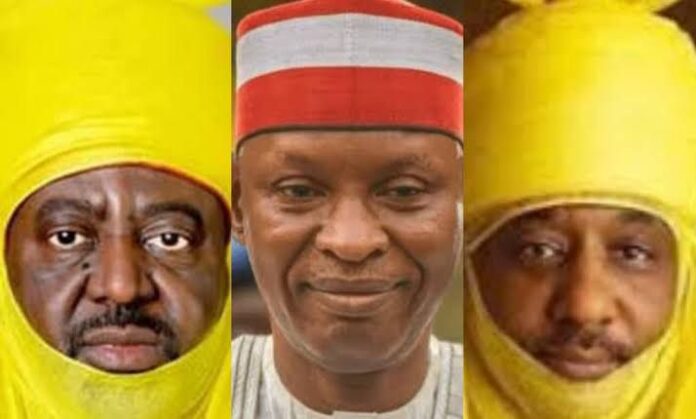NEWS
Ex-UN Envoy Warns Of New Cold War Threatening Africa’s Unity
Renowned diplomat and former United Nations Under-Secretary-General, Ibrahim Gambari, has raised alarms over the looming threat of a new Cold War that could fracture Africa along geopolitical lines.
Speaking at the Realnews Magazine Annual Lecture in Lagos, Gambari urged African leaders to urgently reposition the continent amidst intensifying global power struggles.
The lecture, themed “Africa in World Shifting Geopolitics: Matters Arising on Demography, Technology, Artificial Intelligence, Natural Resources,” explored Africa’s strategic role in a rapidly evolving international system.
READ ALSO: I Make $40,000 Montly With Content Creation Says Blessing CEO
Gambari cautioned that without proactive measures, Africa risks being sidelined or exploited in the unfolding global order.
Africa: Battleground in a New Power Struggle
Describing the increasing militarisation by major global powers, Gambari painted a picture of fierce competition for control over Africa’s resources and strategic locations.
He noted that the proliferation of foreign military bases across the continent is evidence of this struggle.
“A relentless militarisation is taking place across the world—from the Atlantic to the Pacific, the Arctic to the Antarctic,” Gambari said. “Rich in natural resources and strategically located, Africa has become a key battleground in this global power struggle.”
He cited Djibouti as a stark example of Africa’s strategic importance.
The country, located near the Red Sea, hosts both the United States’ only permanent base on the continent, Camp Lemonnier, and China’s first overseas military installation.
Gambari warned that the presence of such bases represents more than security interests, suggesting echoes of colonial ambitions aimed at controlling Africa’s wealth and arable land.
“The seaboard of Africa is already dotted with military bases operated by various powers,” Gambari observed. “The continent is once again at the center of a scramble as the new Cold War intensifies.”
The Return of Zero-Sum Geopolitics
Gambari also highlighted the resurgence of zero-sum geopolitics, where nations compete for influence at the expense of others.
He noted that China and Russia are emerging as dominant players in Africa, with China leveraging infrastructure projects and debt relief, while Russia offers weapons and military support.
“These actions signal a destabilising competition for influence,” Gambari said, adding that traditional powers like France, Germany, India, and the UK are also expanding their presence on the continent.
“The age of zero-sum geopolitics is back, with all its destabilising consequences for African countries,” he said.
Unlocking Africa’s Potential Amid Challenges
Despite the geopolitical rivalry, Gambari emphasized that Africa’s youthful and growing population provides a significant opportunity for the continent to assert its influence globally.
He urged African leaders to invest in education, innovation, and youth-driven initiatives to harness this demographic dividend.
“With well over a billion people and an overwhelmingly youthful population, the African continent is destined for a significant role in the demographics of the world,” Gambari said.
“But we must build national and regional strategies to leverage the energy, innovative acumen, and futuristic vision of our young people.”
Gambari warned that without these strategies, Africa’s demographic advantage could remain underutilised.
He also called for the continent to be proactive in shaping the rules of the emerging global order, rather than being passive participants.
“We cannot afford to sit on the sidelines while the rules of a new world order are being written,” Gambari said.
“We must insist on being joint rule-makers, ensuring the new global order reflects our values and aspirations for a fairer, more inclusive, and equitable world.”
A Call to Action
Gambari concluded with a rallying cry for African leaders to harness the continent’s abundant resources and human capital.
He said Africa must use its demographic and strategic advantages to achieve the structural transformation that has long eluded it.
He said, “We must be ready to harness our abundant human and natural resources to leapfrog our development. Although the outcomes of ongoing geopolitical shifts are uncertain, they need not come at the expense of our people and our continent.”
Gambari stressed the need for bold leadership, warning that Africa cannot afford complacency. “Our youth bulge must become an advantage that places us at the forefront of the digital economy and its innovations,” he said.
NEWS
Ohanivo Upbeat As Sen Umahi Emerges Silverbird’s Most Outstanding Minister Of The Year

The entire 10 communities of the old Ohaozara Local Government Area, known as Ohanivo, of Ebonyi State have been reverberating with joy, because their illustrious son, the Minister of Works, HE Sen. Engr (Dr) Nweze David Umahi emerged Silverbird’s Most Outstanding Honourable Minister of the Year.
Biztellers reports that Ohanivo is made up of three LGAs, including, Ohaozara, Onicha and Ivo, while the 10 autonomous communities are Uburu, Okposi, Aka Eze, Ishiagu, Isu, Onicha, Ugwulangwu, Ukawu, Abaomege, and Oshiri.
Feelers from the organisers of the glamourous awards, Silverbird Group, assure that plans have been fine-tuned for the annual event, billed for the Eko Hotel and Suites, Victoria Island, Lagos on Sunday.
There are indications that a strong team of community leaders including Chief Kenneth Eze, Uche Umezurike, Okoro Enekwachi, Francis Ekwe, Emma Nwaze, among others would be on ground to cheer the distinguished minister of works as he receives his well-deserved award.
ALSO READ: Edo Women Protest Against Natasha Over Akpabio
In a related development, the Member, House of Representatives, representing Ohaozara/Onicha/Ivo Federal Constituency, Hon. (Dr.) Kama Nkemkanma, has sent his congratulatory message to Sen Umahi.
Hon Nkemkanma’s message reads, “It is with deep pleasure that I convey the profound felicitations of my family and good people of Ohaozara/Onicha/Ivo Federal Constituency to our dear leader and achiever, His Excellency, Sen. Engr (Dr) Nweze David Umahi CON, FNSE, FNATE, GGCEHF, Honourable Minister of Works on his emergence as the Silverbird Most Outstanding Honourable Minister of the Year. Whom the cap fits, let him wear.
“Your Excellency, the initiative of this administration to construct the Renewed Hope four (4) legacy projects and the will power to continue the funding and construction of the inherited on-going projects across the six (6) Geo-political Zones are eloquent testimonies of the commitment of Mr President in unlocking the potentials of every segment of our country and building a regenerative economy for sustainable future. We are proud that you have unmitigated signature in this memory. May God continue to give you the flourishing grace and enablement to always be on top in your endeavours.
“Please accept the assurances of the prayers, solidarity, and esteemed regards of my constituents, always. Once more congratulations.”
NEWS
Kano Gov’t Clarifies Appeal Court Ruling On Emirship Dispute

The Kano State Government has addressed widespread misinterpretations surrounding the recent Court of Appeal judgment on the ongoing emirship dispute, urging the public to rely on accurate legal information.
In a statement issued on Saturday, Governor Abba Yusuf’s spokesman, Sunusi Dawakin-Tofa, clarified the ruling and the government’s position.
READ MORE: JUST IN: Court Of Appeal Orders Retrial In Kano Emirate Dispute
Speaking at a press briefing at the Nigeria Union of Journalists (NUJ) Secretariat in Kano, the state’s Attorney General and Commissioner for Justice, Haruna Dederi, explained that the Court of Appeal’s verdict, delivered on January 10, 2025, upheld the repeal of the Kano Emirate Council Law, 2019, effectively overturning the previous judgment of the Federal High Court, Kano.
However, Dederi noted that Alhaji Aminu Dan’agundi, who was dissatisfied with the ruling, has since filed an appeal at the Supreme Court.
He further stressed that the Appeal Court’s judgment remains binding until the Supreme Court rules otherwise.
Addressing concerns over the stay of execution recently granted by the Court of Appeal, the Attorney General described it as a standard legal procedure intended to maintain the status quo pending the Supreme Court’s final decision.
“The Kano State Government urges the public to remain calm, law-abiding, and avoid any form of provocation,” the statement read.
The government has also directed its legal team to thoroughly review the proceedings and determine the next steps in accordance with the law.
On behalf of the governor, Dederi expressed appreciation to the people of Kano for their patience, understanding, and continuous prayers for peace and progress in the state and the nation.
The emirship dispute has been a topic of intense debate in Kano, with various legal and political implications.
NEWS
Niger Delta Youths Threaten Oil Shutdown Over Rivers Crisis

Tensions are rising in Rivers State as the Niger Delta Youth Council (NDYC) has issued a seven-day ultimatum to President Bola Tinubu, threatening to halt oil production in response to the ongoing political crisis in the state.
In a statement signed by its president, Bene Youkore Mamamu, and made available to journalists in Warri on Saturday, the group listed three key demands: the restoration of Rivers State’s statutory revenue allocation, an end to alleged impeachment moves against Governor Similaye Fubara, and a public retraction of reported anti-Ijaw remarks attributed to former Governor and current FCT Minister, Nyesom Wike.
READ ALSO: BREAKING: Rivers Chief Judge Under Probe For Alleged Age Falsification
The youth group warned of dire economic consequences if their demands were ignored.
“We are ready to shock the world in seven days. The oil that fuels this nation flows from our land, the fourth largest and most populated ethnic group in Nigeria. We will not allow Wike, who we suspect is being used by the Presidency, to sabotage our region and undermine Ijaw history,” the statement read.
The NDYC accused Wike of attempting to manipulate the political landscape of Rivers State and marginalize the Ijaw ethnic group, citing his reported comments describing the Ijaws as a “minority within a minority.”
The group labeled the remarks as “provocative, inflammatory, and a declaration of economic and political war.”
Further criticizing the Federal Government, the NDYC alleged that President Tinubu’s administration was enabling Wike’s interference in Rivers politics.
“We are angry that Tinubu’s government has empowered Wike and the Judiciary to undermine Ijaws and the Niger Delta region, with regular threats to impeach Governor Fubara, seize the state’s allocation, insult late Pa Edwin Clark, and rewrite the history of the Ijaw nation,” the letter continued.
With the deadline fast approaching, the NDYC has called on its members to prepare for action, warning that oil production across the region could be disrupted if their demands are not met.
The potential shutdown poses a serious threat to Nigeria’s economy, given that the Niger Delta remains the country’s primary source of crude oil revenue. A disruption could exacerbate economic challenges, including foreign exchange shortages and rising inflation.














